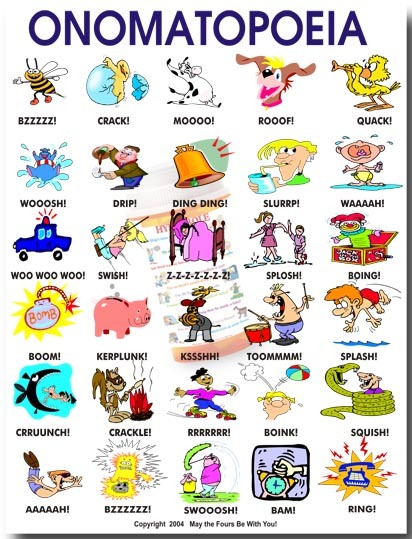 Onomatopoeia is a combination of speech sounds which alms at imitating sounds produced in nature (wind, sea, thunder, etc.) by things (machines or tools, etc.) by people (singing, laughter) and animals. Therefore the relation between onomatopoeia and the phenomenon it is supposed to represent is one of metonymy. Onomatopoeia is the choice of sounds capable of suggesting the image of the object by their very sounding, imitating the signified object or action.
Onomatopoeia is a combination of speech sounds which alms at imitating sounds produced in nature (wind, sea, thunder, etc.) by things (machines or tools, etc.) by people (singing, laughter) and animals. Therefore the relation between onomatopoeia and the phenomenon it is supposed to represent is one of metonymy. Onomatopoeia is the choice of sounds capable of suggesting the image of the object by their very sounding, imitating the signified object or action.
E.g. bubble, splash, rustle, purr, flop, babble, giggle, whistle.
There are two varieties of onomatopoeia: direct and indirect.
Direct onomatopoeia is contained in words that imitate natural sounds, as ding-dong, burr, bang, cuckoo. These words have different degrees of imitative quality. Some of them immediately bring to mind whatever it is that produces the sound. Others require the exercise of a certain amount of imagination to decipher it. Onomatopoetic words can be used in a transferred meaning, as for instance, ding - dong, which represents the sound of bells rung continuously, may mean 1) noisy, 2) strenuously contested.
Direct onomatopoeia - the use of words whose sounds imitate those of the signified object of action (V.A.K.)
Direct onomatopoeia is a combination of speech-sounds which aims at imitating sounds produced in nature (wind, sea, thunder, etc.), by things (machines or tools, etc.) by people (sighing, laughter, patter of feet, etc.) and by animals (I.R.G.) e.g. babble, chatter, giggle, grumble, murmur, mutter, titter, whisper; buzz, cackle, croak, crow, hiss, howl, moo, mew, roar; bubble, splash; clink, tinkle; clash, crash, whack, whip, whisk
e.g. Then with enormous, shattering rumble, sludge-puff, sludge-puff, the train came into the station. (A.Saxton)
Indirect onomatopoeia demands some mention of what makes the sound.
Indirect onomatopoeia is a combination of sounds the aim of which is to make the sound of the utterance an echo of its sense. It is sometimes called “echo writing”: “And the silken, sad, uncertain rustling of each purple curtain” (E.A.Poe), where the repetition of the sound [s] actually produces the sound of the rustling of the curtain or the imitation of the sounds produced by the soldiers marching over Africa:
“We are foot-slog-slog-slog-slogging
Foot-foot-foot-foot-slogging over Africa.
Boots- boots- boots- boots - moving up and down again (Kipling).
